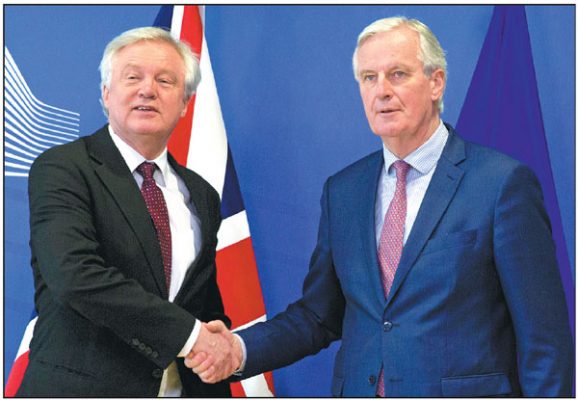
Politicians and business leaders have given a mixed reception to the news that Britain and the European Union have achieved their most significant breakthrough yet in negotiations over relations following Britain’s exit from the EU in March 2019.
Although the Northern Ireland border issue remains unresolved, the two sides have come to agreement on how business will be conducted in a transition period extending until the end of 2020.
Brexit Secretary David Davis said that agreement is conditional on a final withdrawal treaty being agreed, with the transition deal needing approval from European leaders at a meeting later this week.
British business leaders said the transition provides stability for industry to plan ahead, but critics have accused British Prime Minister Theresa May’s government of conceding too much.
The Confederation of British Industry represents the country’s biggest companies. Its Director-General Carolyn Fairbairn said the breakthrough was long overdue.
“This is a victory for common sense that will help protect living standards, jobs and growth. It shows what can be achieved when people and prosperity are placed above politics and ideology,” Fairbairn said.
The director general of the British Chambers of Commerce, Adam Marshall, was also positive about the news.
“While some companies would have liked to see copper-bottomed legal guarantees around the transition, the political agreement reached in Brussels is sufficient for most businesses to plan ahead with a greater degree of confidence,” he said.
Keir Starmer, shadow Brexit secretary for the opposition Labour Party, was also pleased but accused government ministers of having wasted time infighting.
“It is welcome that they have finally struck a deal on transition and now the government must prioritize negotiating a final agreement that protects jobs, the economy and guarantees there will be no hard border in Northern Ireland,” said Starmer.
Labour MP Chuka Umunna, of the pro-Europe Open Britain group, said the concessions Britain had made – such as the British fishing industry being consulted on fish quotas and access to its waters until 2021 – showed the weakness of the government’s position, adding that it would have made more sense to extend the deadline for Britain to leave the EU.
“Despite once claiming they held all the cards in the negotiations, in the end the Brexiters have been prepared to compromise and surrender on almost every single point,” he said.
Conservative MP Jacob Rees-Mogg, who is pro-Brexit and widely tipped as a potential future party leader, called the transition agreement “very unsatisfactory”, adding that it “gives away almost everything and it is very hard to see what the government has got in return”.
Another prominent Brexit supporter, former leader of the anti-EU party UKIP Nigel Farage, was even more blunt, calling May “totally useless” and saying “she must go”.
Continued European involvement in the British fishing industry particular annoys pro-Brexiters, but it is the lack of clarity on the post-Brexit border between Northern Ireland, part of the United Kingdom, and EU member state the Republic of Ireland, that remains the biggest challenge.
This year marks the 20th anniversary of the signing of the Good Friday Agreement, endings years of violence in Northern Ireland, and there are fears that mishandling the border could reverse the progress made in the last two decades.
Former British diplomat Jonathan Powell, who helped create the peace agreement and worked on negotiations over Hong Kong’s return to China, has warned a failure to deal with the issue properly could bring Brexit talks “crashing down”.


